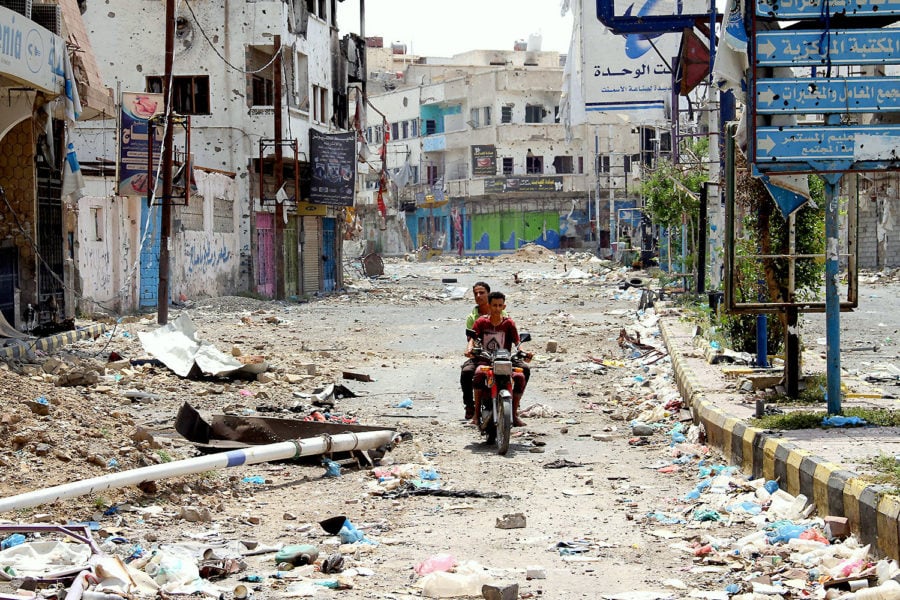The war in Yemen recently entered its seventh year. Its implications reach far beyond the Arabian Peninsula. Yet, the conflict and the unprecedented humanitarian crisis go largely unnoticed in Europe. To break the silence, we share the stories of three young Yemenis, representing the country’s vibrant and courageous civil society.

Background
But first, their stories need some background information. The war in Yemen has its roots in a failed political transition after an Arab Spring uprising in 2011. It forced long-time president Abdullah Saleh to hand over power to vice-president Mansur Hadi. The ensuing national dialogue efforts didn’t result in a solid power-sharing agreement.
Fighting began in 2014. In September of that year, the Houthi Shia rebel movement took Sana’a, forcing the new president into exile. In 2015, Saudi Arabia and other Sunni states, backed by the US and European states, began airstrikes against the Houthis.
The Saudi-led coalition claims Iran is backing the Houthis and wants to get a foothold in the region. The bombing of Sana’a and other places killed thousands of citizens and displaced millions. And as a result of the sea, air, and land blockade of Yemen, imposed by Saudi Arabia since 2015, there is a desperate shortage of basic supplies.
Years of military stalemate followed. Infighting and fragmentation further complicated and entrenched the conflict. Today, three major parties, the Houthis, the internationally recognized government, and the Southern Transitional Council (STC), each backed by different foreign powers, are disputing control over Yemen’s land and resources. Besides these powerful protagonists, there are many other conflicting parties.
Humanitarian crisis
In this patchwork of conflict zones, armed forces and militias are keeping 30 million people hostage. It is the setting of the world’s biggest humanitarian crisis.
For every hundred Yemeni citizens, 80 people need humanitarian aid, 66 have nothing to eat, and 67 do not have access to clean drinking water. Yemen has 30.5 million people. Food insecurity is acute and famine is looming. 10 million people are one step away from starvation. In 2021, FAO and WFP have designated Yemen as one of the most alarming hunger hotspots in the world.
Since the start of the conflict, fighting has displaced 4.3 million people. Hundreds of thousands lost their job. Many of those who still have a job, like civil servants, haven’t received a salary for years. This is especially the case in the Houthi-controlled areas.
And COVID-19 has only worsened the crisis and exacerbated the needs.
Cordaid & CSPPS responses in Yemen
Last year, Cordaid’s humanitarian response focused on primary healthcare (including sexual and reproductive health services), food, shelter as well as water and sanitation, and COVID-19 prevention. We work in close collaboration with our Yemeni partners Yamaan Foundation for Health and Social Development and Youth without Borders Organization for Development (YWBOD).
This year we continue doing the same and expand our activities by integrating mental health and psycho-social support at primary healthcare facilities in Sanaa.
Cordaid hosts and coordinates the Civil Society Platform for Peacebuilding and State Building. The platform currently works with two Yemeni civil society organisations, YWBOD and PDF. Its activities include capacity development support, training, and peer learning.
CSPPS supported Olla Al-Sakkaf, one of the civil society activists whose stories we share here, in here online advocacy. She addressed the UN Security Council during its Yemen meeting in 2020 as well as the closing plenary of the 2021 FriEnt Peacebuilding Forum.
In 2020, CSPPS published a report that covers the challenges and accomplishments of peacebuilders around the globe in simultaneously dealing with COVID-19 and conflict. Maged Alkholidy, also one of the Yemeni civil activists we have interviewed, contributed to this report.
The leading role of Yemen’s civil society
But Yemen cannot be reduced to armed groups and aid. First and foremost, Yemen is its people. Mostly neglected by the media and in the political debate, Yemen’s civil society plays the leading role in coping with the crisis, in creating security and building peace, in reaching out to others, and in paving the way to a better future. Stone by stone, risk by risk. Young Yemeni citizens and civil society activists are doing this against the odds of a daunting geopolitical conflict. Each in her or his own way.
Stories of courage and resilience
We are very grateful to share the stories of three of them. Stories of shattered dreams and aspirations. Of resilience and the courage to pick up pieces and start anew. We want their voices to be heard and their concerns to be reckoned with.
‘It’s high time to rethink international support for Yemen’
“Being young in Yemen is the worst thing you can imagine. But we don’t sit back and just wait for the best. We have to rethink support for Yemen. Humanitarian aid is still crucial, but parallel to that, we need to start investing in the future.” Read Olla Al-Sakkaf’s story.
‘We are all traumatised, but we haven’t given up’
“Yemen will be a tougher place for women and girls for decades to come. Because inside this current war, there are other wars and they will not stop after a peace agreement. Like the war against women. But we can do a lot to stop this.” Read Yasmin Al Qadasi’s story.
‘We, civil society, can teach peace’
“After 20 years of civil struggle, my hair is getting grey. But I am not desperate. Young Yemeni men and women around me give me hope. They have lost so much more than people my age. Yet they keep on giving everything for a better future.” Read Maged Alkholidy’s story.